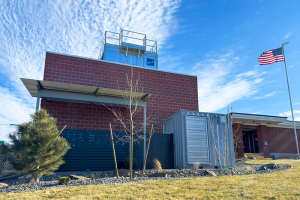Health center prioritizes power resiliency
Going off the grid is a growing trend in California, as many of the state’s residents and businesses have faced rolling blackouts caused by record-setting temperatures, droughts and fires in recent years.
Adventist Health — a faith-based, nonprofit system serving 80 communities on the West Coast and Hawaii — has joined the call for more reliable power systems with a microgrid of its own at the Feather River Health Center in Paradise, Calif.
The solar and microgrid project consists of a 1-megawatt-hour energy storage system combined with 425 kilowatts of solar capacity and a new, permanent backup generator. The integrated renewable system was managed from development and financing to construction and operations by ENGIE North America.
In case of a power outage, the microgrid controller energy storage system will isolate the health facility from the grid, allowing the facility to be powered by solar, the energy storage system and generator, thereby creating a microgrid.
The microgrid will use its own internal battery storage to stabilize the facility loads, and it will also control the generation from both the solar system and the 250-kilowatt permanent generator, allowing Adventist Health to maintain a stable energy source to the facility during the outage. The transfer of power from the utility to the microgrid happens in less than one second.
The health center has become an even more integral part of its community following the 2018 Camp Fire, which severely damaged Adventist’s Feather River Hospital, causing the health system to shift more services to the center.
Tim Williams, administrative director of physician and outpatient services at Adventist Health, says the new microgrid is vital to ensuring continual operation. “Building long-term resiliency is key in this region impacted by risk of natural disasters and subsequent public safety power shutoff events.”




